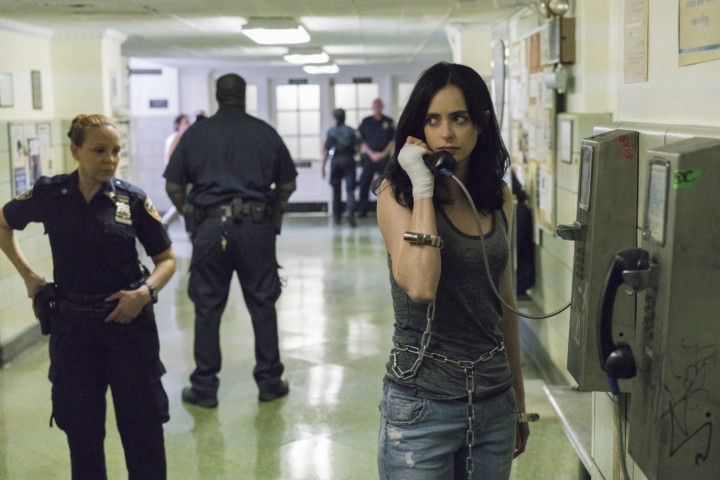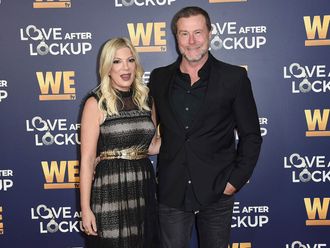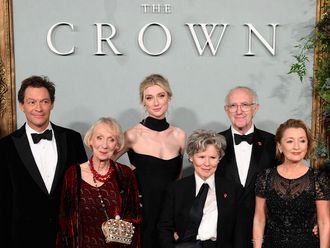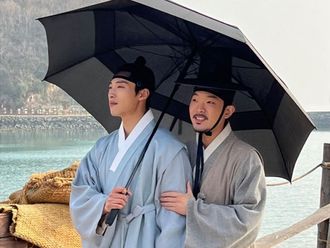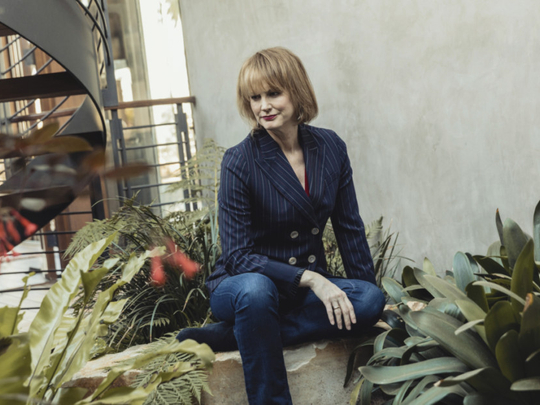
For the past dozen years, Melissa Rosenberg has devoted herself to some seriously gloomy characters.
She was the screenwriter behind the Twilight movies and their tortured vampires, not to mention serving as the head writer on the serial killer drama Dexter, before she created the noir-superhero Netflix series Jessica Jones.
On this late January afternoon, the 6-foot-tall Rosenberg walked across her sunny, sparsely decorated Los Feliz office in a tan blazer, green silk camisole and sleek blond bob, exuding not a trace of gothiness. She has never been the kind of woman who favoured a sepulchral black wardrobe and moody makeup, as her latest show’s heroine does. But with Jessica Jones, which returns on March 8 for a second season, she is able to let the spikiest elements of her imagination run amok.
A hard-drinking private eye who has been physically and emotionally assaulted by a powerful man, Jessica (Krysten Ritter) harnessed her superhuman strength in season one to exact vengeance and protect others from her depraved, mind-controlling abuser. Looking back, it’s slightly eerie how Jessica Jones anticipated the conversations about sexual harassment and assault that bubbled to the surface of American public life these last six months.
Season two had finished shooting when #MeToo exploded, but these 13 new episodes venture even deeper into that toxic territory. While Jessica tries to tamp down the trauma of her past and get on with her work as a hard-boiled detective, her foster sister, Trish (Rachael Taylor), moves in the opposite direction, confronting an older male producer who exploited her when she was a teenage performer.
“We were writing the second season during the whole Trump/Hillary election, and I was just so angry,” Rosenberg said of her team of writers. “We constantly talked about characters that had been trying to be nice for so long, finally just saying, ‘Get out of my way!’ Just tapping into the rage Hillary must have felt every day.”
Although Jessica Jones springs from the Marvel comic Alias, the TV version of Jessica is more self-destructive and nihilistic. Rosenberg also tweaked the original storyline by adding sexual assault to the litany of horrors committed by season one’s villain, Kilgrave, whose spectre hangs over the new episodes.
Rosenberg, 55, said the show’s approach was partly inspired by her own troubling encounters with men as a girl growing up in a permissive Marin County household.
The upside of having hippie parents (her psychologist father Jack Lee Rosenberg wrote the 1973 book Total Orgasm) was the freedom to “create your own reality.” This resulted in impromptu dance performances and neighbourhood plays; she would go on to major in dance and theatre at Bennington.
The downside of having parents “going through their puberty at the same time I was,” Rosenberg said with a wry grimace, was that no one was protecting her, or teaching her to protect herself. “You’re vulnerable to predators and all manner of ills,” she continued. “We were told that we were free, and what’s wrong with you that you’re not embracing your sexuality? It’s like, ‘Well, I’m 13!’”
After graduating from high school at 17, Rosenberg moved to the East Coast to study and perform with a theatre company in New Jersey, and worked a circuit of strip clubs there to support herself. She now thinks she leaned into her sexuality because, she said, “that’s all I felt I had to offer.” This is the kind of dark matter whirling through her writers’ room and into her characters’ heads.
Those edges weren’t particularly welcome in a female television writer when Rosenberg began her career in the mid-1990s on series like Dr Quinn, Medicine Woman, The Magnificent Seven and Party of Five. She recalled struggling “to be one of the guys in the writers’ room.” If she didn’t laugh along with men at sexist conversations that made her uncomfortable, she risked being left out of meetings — or fired.
“If I had been a man, my stridency and my opinionated presence and voice would not have engendered the same kind of response,” Rosenberg said.
A show about a furious female avenger, Jessica Jones now looks like the first step toward a more socially conscious Marvel television and film universe; it was soon followed by Luke Cage, which is steeped in black history and racial politics (and whose lead character was introduced to the public on Jessica Jones) and now Black Panther.
“Marvel works best when you take things from real life and you put them through the Marvel prism, so it doesn’t feel like you are sitting on a soapbox — it feels like you’re watching a drama that has action and adventure and humour in it,” says Jeph Loeb, the head of television for Marvel.
“If what you get from watching ‘Jessica Jones’ is that she is a smart alec detective who is solving crime, great,” Loeb added. “If what you get from it also is that there is a very real, deep-rooted anger in this country and around the world about the way men treat women, then good for us. Melissa really understood that and wanted to play with it in the very unexpected forum of a superhero show.”
To mirror the heroines on-screen, Rosenberg ensured there were a lot of women in the crew. And when she announced that she’d like to have women direct half of the second season, Allie Goss, vice president for original programming at Netflix, countered with a better offer: Why not have female directors take on all 13 episodes?
Jessica Jones was never meant to be “a treatise on women and politics and our lack of power,” Rosenberg cautioned. “In the process of digging into this damaged but strong character, we find ourselves digging into issues as well, but it’s always born out of the process of exploring character. It was a way to get inside Jessica’s anger, to experience my own and that of all of us in the writers’ room.”
That fury propels characters into bruising action, while biting humour leavens the series’ dark tone. In the season two opener, a man tries to persuade her to work with him, smarmily insisting, “I never take no for an answer.” To which Jessica deadpans, “How rapey of you.”
Jessica isn’t a figurehead for strong, liberated womanhood; she is doused in too much whisky, guilt and confusion for that.
“She’s never going to sit there and be depressed for more than a scene or two,” Rosenberg said. “Buried underneath all that alcohol and psychic damage is someone who wants to do good in the world. Ultimately, she’s going to do something about it, because she is a survivor.”
Ritter describes the character of Jones as a two-headed creature that is “half Melissa and half me. Someone on set said that watching the two of us in rehearsal is like watching two teenagers start a band in a garage — all passion and grit and fire.”
__
Don’t miss it!
Jessica Jones season two streams on Netflix from March 8.



